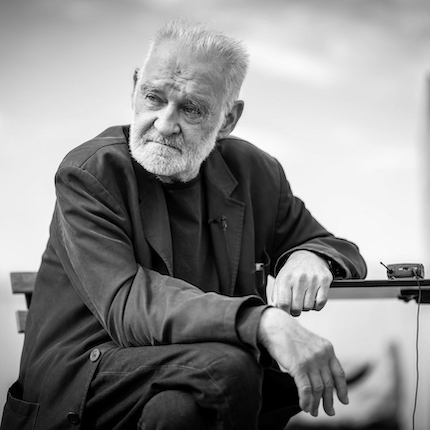European Film Awards 2023 Interview: Béla Tarr on Opera and Long-Form Filmmaking

At the 36th European Film Awards on December 9, legendary Hungarian director Béla Tarr will receive the Honorary Award of the Academy President and Board, recognizing the filmmaker's significant contributions to cinema and his strong political voice.
Tarr, known for his distinct style and impactful films such as Sátántangó and The Turin Horse, has garnered numerous awards, including the Kossuth Prize and a Silver Bear at Berlinale. He is also the honorary president of the Hungarian Filmmakers’ Association and founded film.factory, a film school in Sarajevo. Screen Anarchy sat down with the director before the ceremony for a short talk.
Screen Anarchy: László Krasznahorkai did not get the Nobel Prize for Literature this year again.
Béla Tarr: You know, every award and prize are not within your control. I was really hoping for him, crossing my fingers.
It would be nice if he got it.
Sure.
Are you in touch with László?
Yes, I just finished reading his latest book a week ago. He had sent me the manuscript, or let's say, the final version. And I liked it very much.
How have you been? I know you've been busy teaching and spending time in Prague. Are you currently engaged in any artistic endeavors?
Even though I've stepped back from filmmaking, or let’s say, from feature-length filmmaking, I haven't quit films or creativity altogether. A few years ago, I curated an exhibition [Till the End of the World] in Amsterdam and a hybird work of film-installation [Missing People] in Vienna for 250 homeless people. I'm not just wasting my life; I'm active and involved in various projects.
I heard some rumors that you were working on an opera.
I've been wanting to do that as well, especially a brand-new version of Carmen. My issue is that I'm not fond of Bizet's libretto or music. I've been thinking of creating a completely new Carmen, starting from scratch.
You know, every opera house seems to believe that Bizet's version is the most successful for box office revenues. They're primarily interested in making money and do not want to deviate from the classic version.
I see. Have you rewritten the libretto?
No, not yet. My idea was more about working with actual gypsies. Imagine an opera, but without any singing.
Why opera?
I appreciate music, yet I've never ventured into, let's say, theatrical productions involving a large stage and numerous people. That's why the idea intrigued me.
However, I must admit that my knowledge of operas is limited. I know a bit, of course, but I believe it's best to approach such projects with a fresh perspective, to touch upon something in a different way.
Are you following the current arthouse cinema?
Yeah, of course.
With the emerging trend of longer films, often running three-four hours, becoming more common in contemporary cinema, I often think of you as a pioneer in this long-form storytelling. What is your opinion on this shift towards longer narratives in film becoming more normalized?
The real issue isn't about the length of a film. Honestly, I've seen five-minute short films that were boring. The main question is whether a film is engaging or not, whether it has the power to move you.
The length doesn't matter in that respect. You can't generalize that all long movies are good just because of their duration. No, it's about the quality of the film. If it's good, then the length is irrelevant to me.
But it's fascinating to observe how the norm is shifting, with nine-hour movies now being shown in cinemas and audiences actually sitting through them.
You see, the standard one-and-a-half-hour length for feature films was originally a business decision. But now, in the 21st century, there are no rules. You can make a movie with your phone; the possibilities are endless.
The length of a film shouldn't be the focus. To me, what matters is whether the film is moving, whether it touches the audience. That's the essence of cinema.
Your work often delves into existential themes. How has your personal philosophy evolved since THE TURIN'S HORSE?
It doesn't work like that. It's not about philosophy or such things. It's about living your life, observing, and experiencing. Sometimes you encounter something that grabs or sticks with you, evoking a feeling that you must share with others.
This compulsion drives you to create, regardless of the scale. It could be something impactful for the whole society or just a small, personal thing.
We aren't engineers, nor are we working in a factory. We are sensitive individuals with ideas, visions. We are in pursuit of something, although we might not always know what it will lead to or what will happen.
Can you recall the last instance when something truly touched you, prompting that feeling of wanting to share it with others?
The last time I felt deeply moved was during the Vienna project, Missing People.
Since working on THE TURIN HORSE, has your perceptions of the world changed, particularly in light of the significant events and changes that have occurred over the last 10 to 15 years?
Do you think the world changed? My problem is that nothing has changed. It´s getting worse. And when you say things are getting worse, it means you are not happy.
How did you spend the pandemic?
Like most days, I'm not a very social person.
Do you feel there aspects of your work or films that are misunderstood?
Sometimes there is a misunderstanding, or better to say misinterpretation by a few people. However, my feeling and experience is that most people do understand my work.







